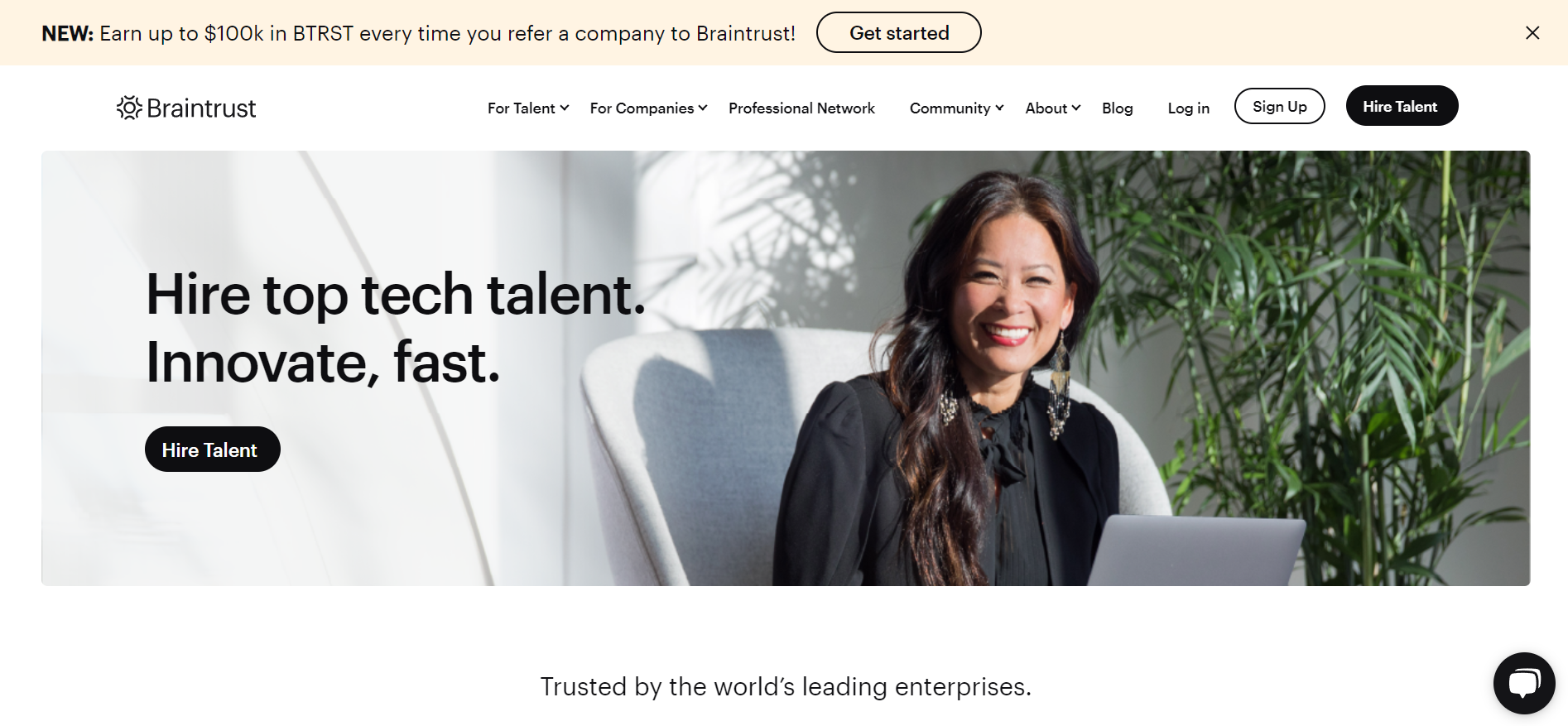
What Is Braintrust (BTRST)?
Braintrust is the first decentralized talent network that connects skilled, vetted knowledge workers with the world’s leading companies. The community that relies on the to find work are the same people who own and build it, ensuring the network always serves the needs of its users, instead of a centrally-controlled corporation. And because the community of knowledge workers and contributors earns ownership and control of through its native BTRST token for its contributions to the network and its growth, new talent and jobs have participated in the network at record speeds.
Braintrust has over 50,000 community members, with knowledge workers and project contributors across the world. Braintrust is used by global enterprises including Nestle, Porsche, Atlassian, Goldman Sachs, and Nike. For more information, visit: www.braintrust.com.
At Braintrust, we’re changing the way work works—for good.
Take ownership
Braintrust is controlled by you, the Talent, through the BTRST token.
Make more money
No talent fees and membership costs so you can keep 100% of what you earn.
Future-proof your career
Spend less time worrying about what’s next with access to long-term jobs.
Get expertly matched
Experts match you to jobs based on your skillsets and interest.
For Talent
Apply today and join a thriving community of highly-skilled tech talent.
- Secure your future – Stop worrying about what’s next – explore full-time roles and contract roles that average 7+ months.
- Keep 100% of what you earn – The talent fee is 0% which means you can set your own rates and keep 100% of what you earn.
- Take control and ownership – Braintrust is user-owned so you can help shape the future of the network with the BTRST token.
For Enterprises
Sign up today and our experts will match you with 3-5 talents within 48 hours or less.
- Skip the hassle and hire the best – They only accept the top 1% of talent applications which means you can vet less and innovate more.
- Get full transparency and control – View work history, client testimonials, sample projects, and more before you make a hire.
- Make your budget go 3-4x further – Consultants and agencies charge up to 70% in markups. At Braintrust you pay just 10%.
How to get started
Apply to join
Fill out an application including your background and experience.
Create a profile
Add your portfolio, skill sets, and work history to get approved.
Land a job
Get matched to jobs with the world’s most innovative companies.
The Problem of Extractive Talent Networks
That same dynamic remains common in talent networks, which should understand that talented people are their chief product and their most important assets — yet don’t treat them that way. DoorDash allowed customers to give drivers tips, only to later seize a portion back as revenue (only reversing course after significant public backlash).6 Fiverr takes 20% of every commission from its workers, whether they’re working a $5 gig7 or a $100 gig. Upwork charges users the same for all projects earning $500 or less — and then charges less for higher-earning projects.8 These networks are disproportionately taking more from their users that make the least.
On the other end of the talent network spectrum, large consulting firms (such as Accenture or PwC) warehouse high-quality talent then impose a hefty markup to their clients. Due to large overhead and a lack of network transparency, they are incentivized to charge exorbitant fees in order to increase profit margins. Such markups are possible because no existing talent networks offer experienced, enterprise-level workers with the demand and supply available on an Uber or Fiverr.9 Lacking other avenues to secure top talent on a project basis, clients are held hostage to the exorbitant prices of those talent network giants — leaving companies reluctant to engage in larger projects.
The Old Way’s Damaging Network Effects
Those examples are in line with the old way of making profits as a talent network: charging high fees or markups while offering talent no ownership or control over company decision-making. Networks hold people’s work history, data, and reputation in walled gardens so they can exclusively monetize their own workers’ information. Because talent has no vote on key decisions, the networks allow themselves to be flooded with users, ultimately driving down pay — sometimes below the minimum wage, as a Georgetown University researcher concluded in a study showing that some Uber drivers were earning less than $5 an hour.10.


















